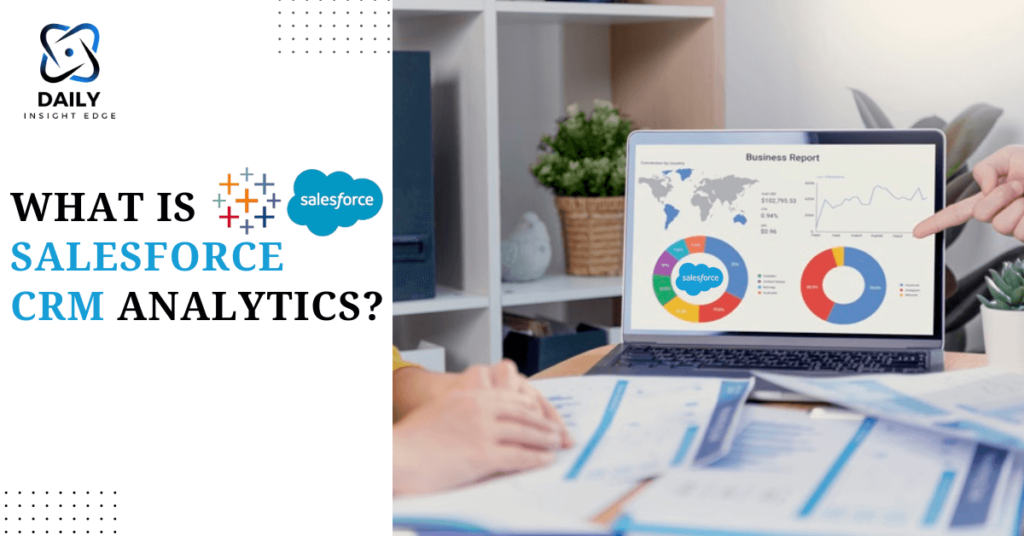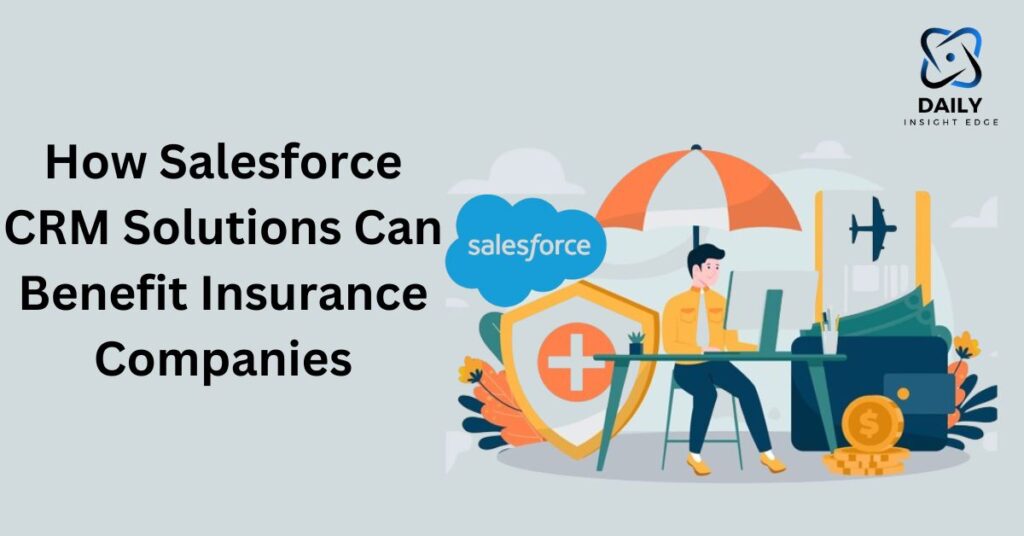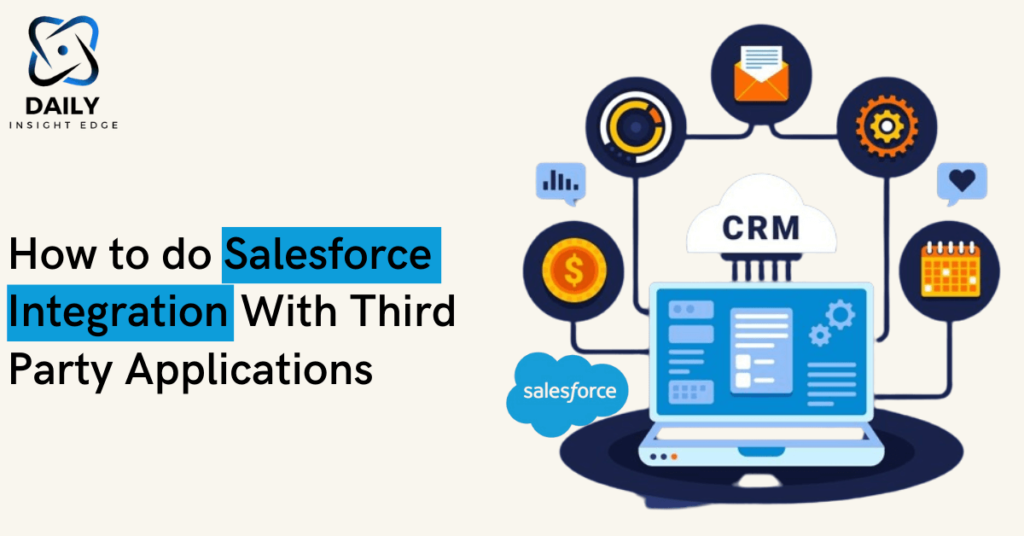Data and analytics are two important components that can change the course of decisions in an organization. However, having simple data is only good enough to drive expected results once and if you translate it into actionable insights. Still, many organizations face challenges in getting user-friendly and accessible analytics, hence making decisions not backed up by analysis and interpretation. Take the example of sales or customer service representatives who mostly rely on CRM but spend less time on insights and restructuring their actions according to it. To simplify their workflow, they need easily accessible and actionable insights.
These requirements are the reason for introducing CRM Analytics or Salesforce Tableau CRM. With its Salesforce-native integration, Tableau CRM Einstein Analytics goes beyond embedded dashboards, offering teams already operating within the Salesforce platform a range of additional advantages. Salesforce CRM Analytics is a cloud-based platform that analyzes data, you can discover hidden patterns, find better sales and growth opportunities, and improve business processes.
This blog will help you understand what is Salesforce CRM Analytics? and how to use it to boost different aspects of your business. Keep reading; you will find something worthy for your processes.
What is Salesforce CRM Analytics?
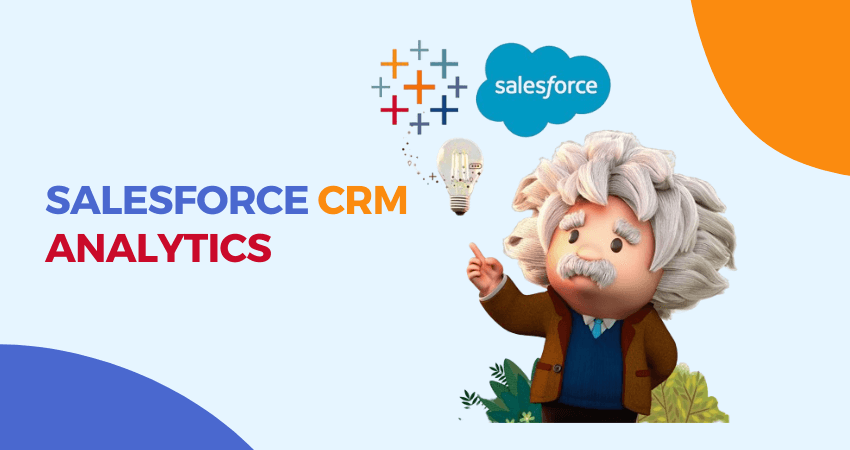
The native analytics of Salesforce CRM Analytics (earlier known as Tableau CRM and Salesforce Einstein Analytics) empowers users with AI-powered insights. It integrates with your existing workflow, allowing users to find answers, make accurate predictions, and allow them to take swift actions based on the valuable insights gained from the platform.
With these insights, customer-facing teams can prioritize, collaborate seamlessly, and achieve stronger business results through streamlined processes.
Businesses can confidently make data-informed decisions by leveraging CRM analytics, leveraging their CRM platform beyond a mere record-keeping system. It has become a powerful tool that supports sales reps and service agents by connecting their data, presenting intuitive visuals, and offering predictive insights.
This maximizes the ROI of your CRM investment, enabling teams to be more productive with actionable answers and personalized customer interactions.
Who Are The Users of CRM Analytics?
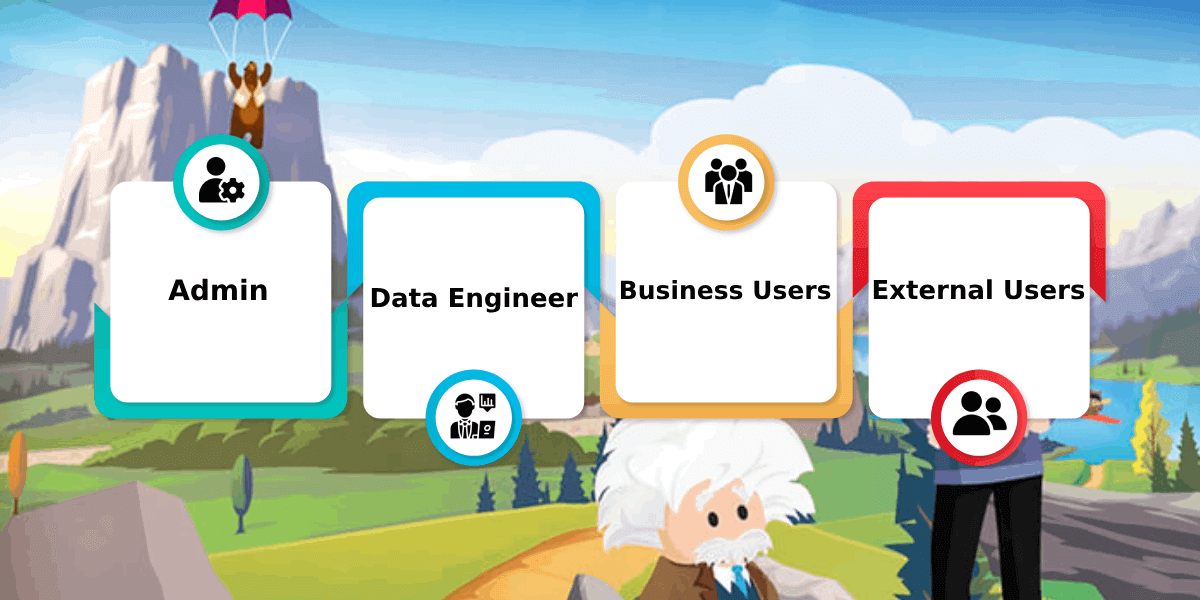
Admin
Admins can control CRM Analytics functionalities, including user management, dataset handling, dashboard creation, and report generation. They are also responsible for configuring Salesforce CRM Analytics by establishing permissions, ensuring security measures, and managing data accessibility.
Data Engineer or Analyst
Professionals specializing in data analysis are tasked with importing and organizing data sourced from platforms like Salesforce. Their role involves compiling reports to facilitate informed decision-making and constructing visual dashboards to monitor performance metrics effectively.
Business Users
Business users can utilize generated reports and dashboards to gain valuable insights into their operations. They can share these insights with colleagues and take necessary actions to enhance business efficiency.
External Users
External users and partners utilizing Salesforce AppExchange can tap into CRM Analytics tools to analyze business performance. Additionally, roles such as marketing managers, sales managers, customer service representatives, and financial analysts can all benefit from the analytical capabilities provided by Tableau CRM Analytics.
Read Also: Salesforce Integration With Third Party
Salesforce CRM Analytics Features
Take a quick look at what features CRM Analytics Salesforce provides to its users and how you can put these functionalities to your usage and achieve your goals:
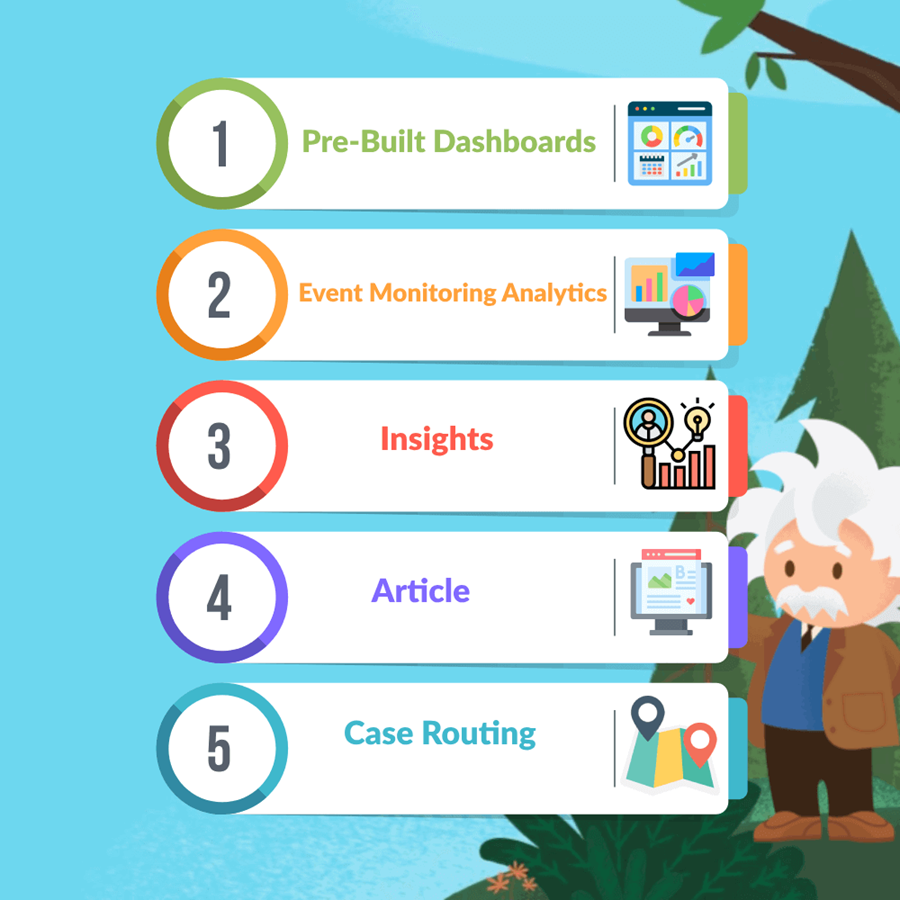
1. Pre-Built Dashboards
To deliver users an immersive experience, Salesforce offers free trial access with a rich collection of sample datasets, dashboards, and applications. You can quickly dive into the trial by signing up and logging in using your Einstein platform credentials.
Upon accessing the trial, you’ll find a range of sample dashboards on the homepage, waiting to be explored. These dashboards offer diverse ways to visualize and interact with the data, allowing you to gain valuable insights and discover the capabilities of Tableau CRM Analytics firsthand.
2. Event Monitoring Analytics
With EveWith Event Monitoring Analytics, businesses can track user activity and maintain data security. This tool enables monitoring of individual events, detecting changes in user behavior, and taking prompt actions to protect data.
Event monitoring covers logins, logouts, Lightning and URI interactions, API calls, Apex executions, and Reports exports. These insights empower teams to protect data proactively and ensure a secure environment.
3. Recommendations and Insights
Traditional analytics allows users to understand the past and predict the future. Tableau CRM Einstein Analytics powered by AI, provides a holistic view of upcoming scenarios. Using Einstein Discovery, you can utilize relevant KPIs to make predictions and receive insightful recommendations for optimizing outcomes.
4. Article Recommendations
Salesforce CRM Analytics supports various service scenarios beyond precise responses, such as knowledge articles in Salesforce’s customer support hub. With Salesforce Einstein Analytics, the system identifies the exact information that meets your needs. Customers can quickly access the relevant information through self-service, eliminating the need to search the entire knowledge base or rely on keyword searches. Einstein’s intelligence streamlines the process, ensuring swift and precise access to the right content.
5. Case Routing
Tableau CRM Salesforce, a new feature in Salesforce, automates case routing by considering factors like agents’ skills and past success. This ensures cases are directed to the most suitable queue, improving resolution outcomes and saving time. Users enjoy shorter resolution times and a streamlined process without human intervention, even with diverse products and changing customer expectations.
Benefits of CRM Analytics Salesforce
Salesforce CRM Analytics provides various advantages for businesses looking to perform their sales processes and improve overall performance.
Here are some of the key benefits of CRM Analytics
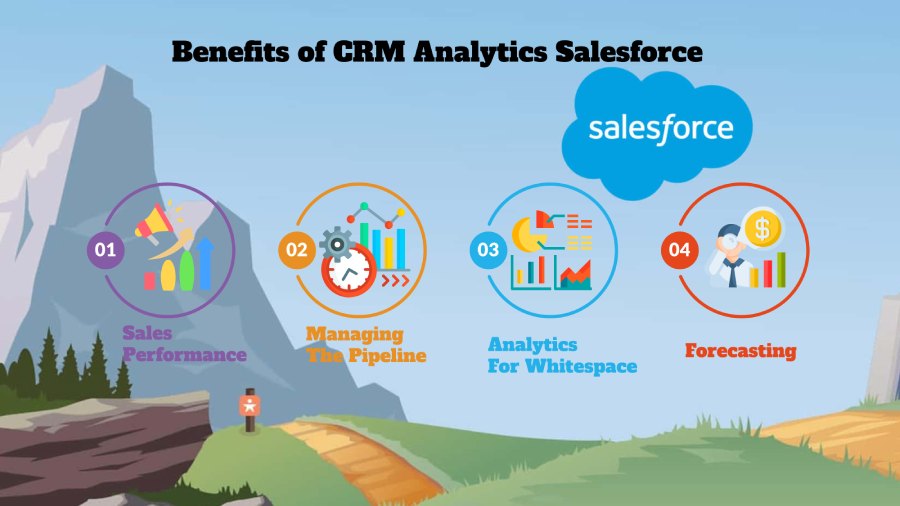
1. Sales Performance
Responsibility for overseeing the entire sales pipeline falls to the sales manager, who assesses achievements and performance across various stages of the sales timeline. Subsequently, team members are prompted to compare their performance against predetermined quotas. The Leader View Dashboards provide an advanced overview of all key performance indicators (KPIs), facilitating in-depth data analysis and enabling action to be taken within the application interface without switching to another platform.
2. Managing the Pipeline
Teams can continuously adapt to changes in the opportunity pipeline in real time using CRM Analytics Salesforce (Tableau CRM). Additionally, they can monitor deals entering and leaving the sales timeframe and evaluate the success or failure of closed deals.
Furthermore, Salesforce Tableau CRM assists in identifying ongoing trends in opportunity classification, facilitating the creation of sales pipelines, and compiling a crucial list of potential opportunities accessible within the application. The platform dynamically adjusts parameters for all sales processes on dashboards and swiftly provides requested data, particularly when sales representatives are managing sales operations.
3. Analytics for Whitespace
It simplifies the process of pinpointing potential deals by implementing whitespace analytics. Additionally, it enables the anticipation of which products are likely to be sold to specific accounts, while also tailoring opportunities based on the unique requirements of each account.
4. Forecasting
Salesforce CRM Analytics provides Sales professionals with valuable forecasting capabilities. It enables accurate prediction of sales and revenue, empowering reps to plan sales timelines and approach upcoming quarters effectively. Through the forecasting functionality, users can leverage forecasting dashboards for strategic planning.
Moreover, it allows for the analysis of deals with potential for closure. Users have the option to set up notifications for two scenarios: when there is a change in pipeline numbers or when significant changes occur in deals.
Users can experience significant benefits with Salesforce CRM Analytics, including:
- Achieving a 37% increase in sales growth
- Accelerating deployment speed by 55%
- Enhancing customer satisfaction by 45%
- Boosting marketing ROI by 43%
Why Do Businesses Need Salesforce Tableau CRM Analytics?
CRM Analytics is one of those tools that gives businesses a competitive edge. It leverages its functionality to serve various purposes of different aspects of businesses, like marketing, sales, customer support, and more.
Check out in detail how the capabilities of Salesforce CRM analytics can help these business segments:
Salesforce CRM Analytics for Marketing
- Tableau CRM provides valuable insights into customer behavior, preferences, and interactions, it allows marketers to understand what are their target audience better.
- Marketers can use Salesforce Tableau CRM to segment their audience and create targeted and customized marketing campaigns.
- Marketers can measure and track how well their marketing efforts are going in the market. They can do it with the help of several key performance indicators (KPIs) such as conversion rates, customer acquisition costs, and campaign ROI.
- By analyzing customer purchasing patterns and preferences, Salesforce CRM analytics helps marketers identify upsell and cross-sell opportunities.
- With Tableau CRM Salesforce, marketers can make data-informed decisions to optimize marketing strategies and deliver personalized experiences.
CRM Analytics for Sales
- Performance Analysis: CRM analytics allows sales teams to analyze key sales metrics, such as pipeline, win rates, and revenue forecasts, to identify areas for improvement and increase overall performance.
- Customer Segmentation: Segmenting customers based on demographics, buying behavior, and engagement levels, it offers sales teams to tailor their approach and offers, resulting in higher conversion rates.
- Sales Forecasting: Tableau CRM Einstein Analytics provides accurate sales forecasts based on historical data and market trends, enabling better resource planning and goal setting.
- Territory Management: CRM analytics salesforce optimizes sales territories by analyzing customer data and market potential, ensuring efficient resource allocation, and maximizing sales opportunities.
- Account Management: It provides insights into customer preferences and buying patterns, enabling sales teams to personalize interactions and build stronger customer relationships.
- Opportunity Analysis: It helps identify high-value opportunities and assess the likelihood of closing deals, allowing sales reps to prioritize their efforts effectively.
- Competitor Analysis: By analyzing competitor data, Salesforce CRM Analytics helps sales teams understand market dynamics, adjust strategies, and gain a competitive edge.
CRM Analytics for Customer Support
- Customer Insights: It provides customer support teams comprehensive insights into customer behavior, preferences, and interactions, enabling personalized and targeted support.
- Service Level Monitoring: Tableau CRM Salesforce tracks and analyzes key performance indicators, such as response time, resolution time, and customer satisfaction, enabling support teams to monitor and improve service levels.
- Self-Service Enablement: CRM analytics identifies frequently asked questions and common support issues, empowering customers with self-service resources and reducing the volume of support requests.
- Agent Performance: Tableau CRM evaluates agent performance metrics, such as ticket resolution rate and customer satisfaction scores, enabling managers to provide targeted coaching and training for continuous improvement.
- Escalation Management: CRM analytics identifies critical or high-priority support cases that require immediate attention, facilitating timely escalation and resolution.
- Knowledge Base Enhancement: It analyzes support ticket data to identify knowledge gaps and areas where additional resources or documentation can be developed to improve self-service and support quality.
- Customer Satisfaction Analysis: CRM analytics measures customer satisfaction and sentiment through feedback and survey data, helping support teams understand areas for improvement and enhancing overall customer experience.
Salesforce CRM Analytics Pricing
After following the acquisition of Tableau, Salesforce continued its commitment to transformation and value improvement with the introduction of Salesforce CRM Analytics, also known as Tableau CRM.
For business professionals who want data-driven decision-making, evaluating the pricing options for CRM Analytics is essential to align with their specific needs and requirements.
Here are the Salesforce CRM Analytics pricing details:
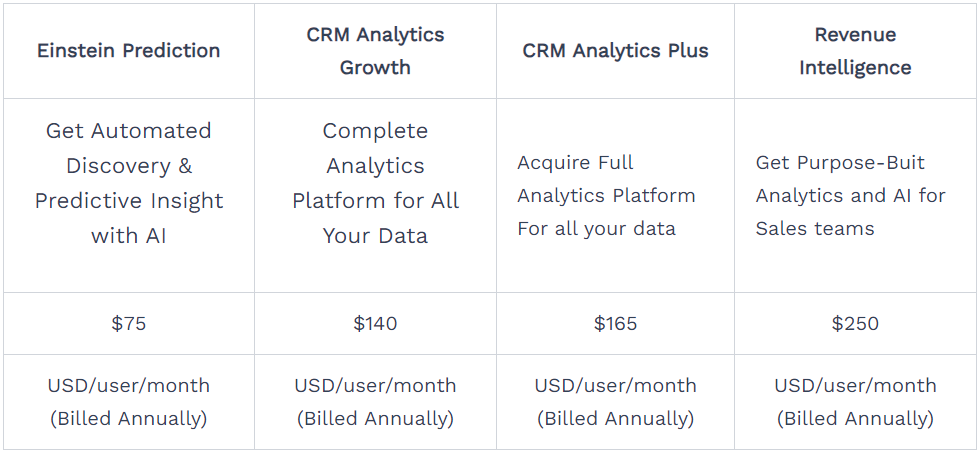
Final Thoughts
Businesses and organizations can improve lead generation and customer relationships by customizing and analyzing customer data. With getting insights from Salesforce CRM Analytics, targeted marketing campaigns and personalized customer experiences become possible.
Adopting CRM Analytics can transform customer services and boost customer satisfaction. By addressing customer support and service challenges, businesses can elevate the overall customer experience. If you’re considering Salesforce CRM Analytics, now is the time to connect with one of the best Salesforce industry experts.
Frequently Asked Questions
1. Salesforce CRM Analytics offers what types of analytics?
CRM Analytics offers various types of analytics such as marketing, sales, service, and custom analytics. These analytics easily cover several features such as pipeline performance, customer fulfillment, lead conversation, and more.
2. How does Salesforce CRM Analytics integrate with Salesforce CRM?
Salesforce CRM Analytics seamlessly integrates with Salesforce CRM, it allowing users to access and analyze their CRM data directly within the Salesforce platform. This integration ensures analytics are based on real-time, up-to-date data from Salesforce CRM.
3. Is it possible to customize Salesforce CRM Analytics to meet specific business needs?
Absolutely Yes, Salesforce CRM Analytics or Tableau CRM analytics can be easily customized according to the business requirement. User can make customized reports, dashboards, and analytics modules modified to their specific metrics, KPIs, and business needs.
4. In what ways does Salesforce CRM Analytics use AI and machine learning?
Salesforce CRM Analytics leverage AI and machine learning algorithms to offer predictive analytics, and patterns and make data-driven recommendations. These abilities help businesses or organizations anticipate customer needs, forecast sales trends, and optimize marketing strategies.

Eliana Cooper is a highly analytical and results-oriented SEO Analyst and Digital Marketing Professional. She is an expert in blogging and content marketing, always sharing the newest trends and innovations at Daily Insight Edge.

